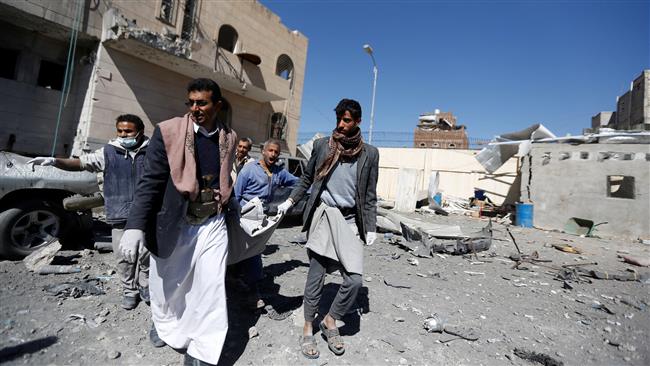
RNA - “Our office in Yemen verified that 136 civilians and non-combatants were killed and some 87 injured as a result of airstrikes in Sana’a, Sa’ada, Hudaydah and Ta’izz governorates in the period from December 6 to 16,” Rupert Colville, the OHCHR spokesman, said on Tuesday.
He added that UN officials are “deeply concerned at the recent surge in civilian casualties in Yemen.”
The attacks included airstrikes on Arabic-language Yemen Today television station, a hospital in the Red Sea port city of Hudaydah and a series of strikes targeting a prison in Sana’a that reportedly killed 43 people.
Saleh was killed on December 4 while attempting to escape the capital Sana’a to Ma’rib province. This came shortly after he broke ranks with Houthis in favor of the Saudi-led coalition.
Meanwhile, hundreds of world figures have urged the leaders of the United States, France and Britain on Tuesday to stop “stoking the flames of war” in impoverished Yemen.
The statement, signed by 355 high-profile figures, marked the 1,000th day of the Saudi-led military aggression against Yemen.
The signatories included eight Nobel peace laureates, religious leaders, Western lawmakers and rights defenders, as well as U.S. Congresswomen Barbara Lee and Pramila Jayapal, and Congressman Ro Khanna, all Democrats.
“To prevent further catastrophe and famine, Yemen needs an immediate cease-fire; an end to all blockages on access for food, fuel and medical supplies; and investment in a new, inclusive peace process,” the statement read.
It appealed on President Donald Trump, British Prime Minister Theresa May and French President Emmanuel Macron.
“If you don't want the burden of the lives of thousands more Yemeni children on your hands, then the time to act is now. Yemen can't wait any longer,” it said.
The appeal also called on the UN Security Council to press Saudi Arabia and the United Arab Emirates to end the war in Yemen, which has turned the poor Arab country into the world's largest humanitarian crisis.
Saudi Arabia has been incessantly pounding Yemen since March 2015 in an attempt to crush the popular Houthi Ansarullah movement and reinstate the former Yemeni president, Abd Rabbuh Mansur Hadi, a staunch ally of the Riyadh regime.
More than 12,000 people have been killed since the onset of the campaign more than two and a half years ago. Much of the Arabian Peninsula country's infrastructure, including hospitals, schools and factories, has been reduced to rubble due to the war.
The Saudi-led war has also triggered a deadly cholera epidemic across Yemen.
According to the World Health Organization’s latest count, the cholera outbreak has killed 2,167 people since the end of April and is suspected to have infected 841,906.
On November 26, the United Nations children’s agency (UNICEF) said that more than 11 million children in Yemen were in acute need of aid, stressing that it was estimated that every 10 minutes a child died of a preventable disease there.
Additionally, the UN has described the current level of hunger in Yemen as “unprecedented,” emphasizing that 17 million people are now food insecure in the country.
It added that 6.8 million, meaning almost one in four people, do not have enough food and rely entirely on external assistance.
A recent survey showed that almost one third of families had gaps in their diets, and hardly ever consumed foods like pulses, vegetables, fruit, dairy products or meat.
More than 3 million pregnant and nursing women and children under 5 also need support to prevent or cure malnutrition.
847/940